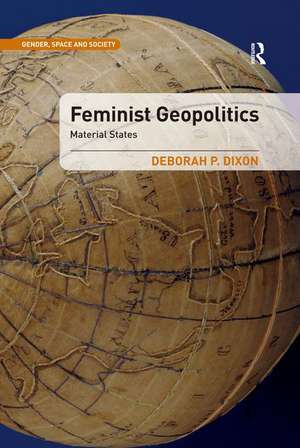Feminist Geopolitics: Material States: Gender, Space and Society
Autor Deborah P. Dixonen Limba Engleză Paperback – 4 dec 2015
| Toate formatele și edițiile | Preț | Express |
|---|---|---|
| Paperback (1) | 479.73 lei 6-8 săpt. | |
| Taylor & Francis – 4 dec 2015 | 479.73 lei 6-8 săpt. | |
| Hardback (1) | 1002.63 lei 6-8 săpt. | |
| Taylor & Francis – 4 dec 2015 | 1002.63 lei 6-8 săpt. |
Preț: 479.73 lei
Nou
Puncte Express: 720
Preț estimativ în valută:
91.80€ • 100.03$ • 77.35£
91.80€ • 100.03$ • 77.35£
Carte tipărită la comandă
Livrare economică 23 aprilie-07 mai
Preluare comenzi: 021 569.72.76
Specificații
ISBN-13: 9781472480200
ISBN-10: 1472480201
Pagini: 208
Ilustrații: Includes 10 b&w illustrations
Dimensiuni: 156 x 234 x 11 mm
Greutate: 0.39 kg
Ediția:New ed
Editura: Taylor & Francis
Colecția Routledge
Seria Gender, Space and Society
Locul publicării:Oxford, United Kingdom
ISBN-10: 1472480201
Pagini: 208
Ilustrații: Includes 10 b&w illustrations
Dimensiuni: 156 x 234 x 11 mm
Greutate: 0.39 kg
Ediția:New ed
Editura: Taylor & Francis
Colecția Routledge
Seria Gender, Space and Society
Locul publicării:Oxford, United Kingdom
Public țintă
Postgraduate and UndergraduateCuprins
Contents: Preface; What can a feminist geopolitics do?; Imagining feminist geopolitics; Flesh; Bones; Abhorrence; Touch; Inhabiting feminist geopolitics; Index.
Notă biografică
Deborah P. Dixon is Professor of Geography in the School of Geographical and Earth Sciences at Glasgow University, UK.
Recenzii
’Deborah Dixon has written a deeply insightful geopolitics for the 21st century. In this intellectually adventurous book she breaks apart the narrow confines of classical and contemporary geopolitical theory to insert a central place for the unruly potential of bodies and Earth. Feminist Geopolitics: Material States is a transformative contribution to both geopolitical and feminist thought.’ Sallie Marston, University of Arizona, USA
Descriere
Deborah P. Dixon cautions against the exhaustion of feminist geopolitics as a critique of both a classical and a critical geopolitics, and points instead to how feminist imaginaries of Self, Other and Earth allow for all manner of work to be undertaken. While providing a much-needed, sustained interjection that draws out achievements to date, the book gestures forward to productive lines of inquiry and method. Grounded via a series of globally diverse case studies that traverse time as well as space, Feminist Geopolitics feels for the borders of geopolitical thought and practice by navigating four complex and corporeally-aware objects of analysis, namely flesh, bone, touch and abhorrence.

















